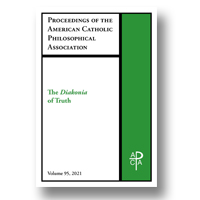|
21.
|
Proceedings of the American Catholic Philosophical Association:
Volume >
84
Michael Storck
The Meaning of the Word Art:
A Neothomistic Investigation
abstract |
view |
rights & permissions
| cited by
In this paper I investigate how works of fine art differ from products of craft. I argue that historical and institutional definitions are incomplete becausethey fail to explain what is common to everything we call art. I then consider the way in which Francis J. Kovach and Jacques Maritain define art. I argue thatKovach’s four-fold division fails on logical grounds. Maritain’s division, however, makes the distinction between fine and useful art a matter of degree, not a division into separate species. This does reflect our use of the word art, and means that, when we call something a work of fine art, we are not designating it as part of a species. Rather we signify that it possesses a particular attribute which, in some way, belongs to every product of human making, but is more clearly present, or more attended to, in works of fine art.
|
|
|
22.
|
Proceedings of the American Catholic Philosophical Association:
Volume >
84
Eric W. Hagedorn
Is Anyone Else Thinking My Thoughts? Aquinas’s Response to the Too-Many-Thinkers Problem
abstract |
view |
rights & permissions
| cited by
It has been recently argued by a number of metaphysicians—Trenton Merricks and Eric Olson among them—that any variety of dualism that claims that human persons have souls as proper parts (rather than simply being identical to souls) will face a too-many-thinker problem. In this paper, I examine whether this objection applies to the views of Aquinas, who famously claims that human persons are soul-body composites. I go on to argue that a straightforward readingof Aquinas’s texts might lead us to believe that he falls prey to Merricks and Olson’s objection, but that a more heterodox interpretation reveals a way to avoidthis problem.
|
|





